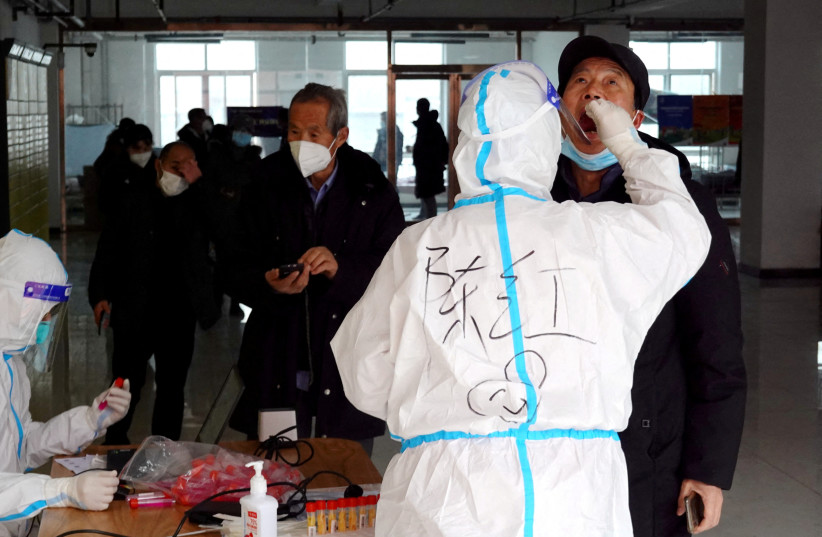Global COVID-19 infections hit a record high over the past seven-day period, Reuters data showed on Wednesday, as the new Omicron variant raced out of control, keeping workers at home and overwhelming testing centers.
Almost 900,000 cases were detected on average each day around the world between Dec. 22 and 28, with myriad countries posting new all-time highs over the past 24 hours, including the United States, Australia and many in Europe.
Almost two years after China first alerted the World Health Organisation (WHO) to a cluster of "viral pneumonia" cases of unknown origin in the central city of Wuhan, the regularly mutating coronavirus is still wreaking havoc, forcing numerous governments to rethink quarantine and test rules.
Although studies have suggested the Omicron variant is less deadly than some of its predecessors, the huge numbers of people testing positive mean that hospitals in some countries might soon be overwhelmed, while businesses might struggle to carry on operating because of workers having to quarantine.
"Delta and Omicron are now twin threats driving up cases to record numbers, leading to spikes in hospitalisation and deaths," WHO director-general Tedros Adhanom Tedros told a news briefing on Wednesday.
"I am highly concerned that Omicron, being highly transmissible and spreading at the same time as Delta, is leading to a tsunami of cases."

France, Britain, Italy, Spain, Portugal, Greece, Cyprus and Malta all registered record numbers of new cases on Tuesday, while the average number of daily COVID-19 cases in the United States hit a record 258,312 over the past seven days, according to a Reuters tally on Wednesday. The previous peak was a figure of 250,141 registered in early January this year.
US Centers for Disease Control and Prevention Director Rochelle Walensky, in television interviews on Wednesday, said she expected many more US cases ahead.
British Prime Minister Boris Johnson said that 90% of patients ending up in intensive care had not received booster vaccines, which medics say is the best protection against Omicron.
"The Omicron variant continues to cause real problems, you're seeing cases rising in hospitals, but it is obviously milder than the Delta variant," Johnson said.
New daily infections in Australia spiked to nearly 18,300 on Wednesday, eclipsing the previous pandemic high of around 11,300 a day earlier.
Australian Prime Minister Scott Morrison said his country needed "a gear change" to manage overburdened laboratories, with long walk-in and drive-in queues reported in a number of areas.
Testing bottlenecks have also built in Europe, including Spain where demand for free COVID-19 testing kits provided by Madrid's regional government far outstripped supply, with long queues forming outside pharmacies.
'I JUST WANT TO GO HOME'
A number of governments were also increasingly worried by the huge numbers of people being forced into self-isolation because they had been in contact with a coronavirus sufferer.
"We just can't have everybody just being taken out of circulation because they just happen to be at a particular place at a particular time," Australia's Morrison told reporters.
Italy was expected to relax some quarantine rules on Wednesday over fears the country will soon grind to a halt given how many people are having to self-isolate protectively, with cases doubling on Tuesday from a day earlier to 78,313.
However, China showed no let up in its policy of zero tolerance to outbreaks, keeping 13 million people in the city of Xian under rigid lockdown for a seventh day as new COVID-19 infections persisted, with 151 cases reported on Tuesday.
"I just want to go home," said a 32-year-old mechanic, who was in Xian last week for a business trip when the city was effectively shut off from the outside world.
No cases of Omicron have been announced in Xian so far.
Many countries are still grappling with the earlier Delta variant, including Poland, which reported 794 COVID-related deaths on Wednesday - the highest number in the fourth wave of the pandemic.
Deputy Health Minister Waldemar Kraska said more than 75% of those who died were unvaccinated.
Early data from Britain, South Africa and Denmark suggests there is a reduced risk of hospitalization for Omicron compared with Delta, the WHO said in its latest epidemiological report.
However, the report said further data was needed to understand how severity of illness may be impacted by vaccination and, or, prior infection.
The surge in cases is coinciding with the New Year holidays, normally a period of parties and travel. Some countries, such as Italy, have canceled public celebrations, while authorities in Japan urged residents to keep end-of-year gatherings small.
"The highest risk is meeting people without taking adequate measures to prevent infection," said Norio Ohmagari, director of the Disease Control and Prevention Center and a top health advisor to the Tokyo Metropolitan Government.
